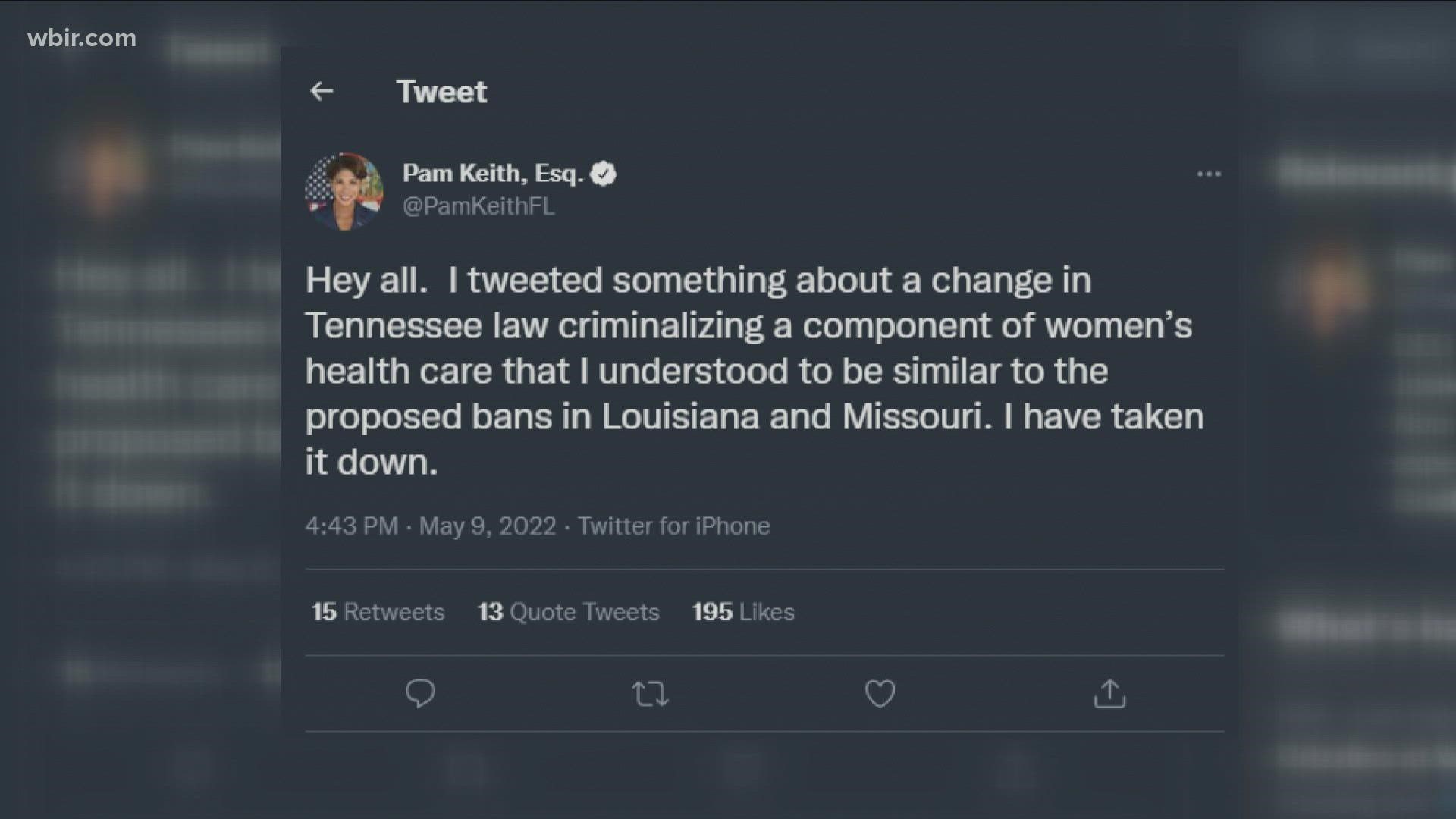NASHVILLE, Tenn. — Confusion erupted on social media last week over the legality of Plan B 'morning after pills' in Tennessee after a tweet with incorrect information went viral over a recently-signed law that will specifically ban abortion-inducing medication from being sent through the mail in the state.
In a now-deleted post, Pam Keith, an attorney and Democratic politician who formerly ran to represent Florida in the U.S. House and Senate, incorrectly claimed on May 7 in a tweet that "Tennessee just banned Plan B and made it a crime punishable by a $50,000 fine to order it."
The incorrect tweet attracted a significant amount of national attention with thousands of people retweeting it, with some expressing concern about access to emergency contraceptives and others asking Keith to pull down or correct the tweet due to the incorrect information.
Keith eventually deleted the original post and tweeted two days later, "I tweeted something about a change in Tennessee law criminalizing a component of women's health care that I understood to be similar to the proposed bans in Louisiana and Missouri. I have taken it down."
What was actually signed into law?
Tennessee Governor Bill Lee last week signed a bill into law that prevents patients from getting abortion-inducing medicine specifically in the mail. That includes any medicine, drug or substance provided "with the intent of terminating the clinically diagnosable pregnancy of a patient," such as mifepristone, misoprostol and methotrexate.
The law, which was named the "Tennessee Abortion-Inducing Drug Risk Protocol Act," targets a measure enacted in April 2021 by the Food and Drug Administration that allows people permanent access to abortion-inducing medication via mail-in pharmacies.
It does not specifically ban abortion pills in Tennessee — it primarily targets mail-in access to them by threatening to penalize pharmacists who provide the service to Tennesseans with criminal and civil penalties, saying the pills can only be dispensed by a "qualified physician" in person. It also adds some clauses for physicians to follow that could deter people from seeking abortion medication, such as requiring physicians to tell patients they "may see the remains of the unborn child."
Even though the law does not ban abortion pills, Tennessee is one of several states that has passed a trigger ban on abortion treatments, which would automatically take effect after 30 days and make abortion treatments a felony in the state in the event Roe v. Wade is overturned.
What is Plan B?
Plan B is not the same as abortion medication, because it does not terminate a pregnancy. Plan B is an over-the-counter emergency contraceptive typically made with progestin, a synthetic version of the hormone progesterone that regulates ovulation. The same synthetic progestogen is found in daily birth control pills alongside estrogen.
Plan B can be freely bought at drug stores, and the FDA removed age restrictions on most brands of the pill in 2013. A similar form of emergency contraception, ulipristal acetate (UPA), was approved by the FDA in 2010 — but it is currently only available as a prescription.
Plan B emergency contraceptive pills are meant to prevent pregnancy after unprotected sex or if other contraceptive measures failed. They are only effective at preventing pregnancy when taken up to 72 hours after intercourse because it delays ovulation and prevents fertilization.
As it stands, Plan B is legal and will remain so in Tennessee and across the U.S. for the foreseeable future.
However, that doesn't mean the legality of Plan B wouldn't be challenged by anti-abortion laws and selective interpretations of how the pill works to prevent pregnancies.
A key question that may come into play over emergency contraception if Roe v. Wade is overturned: Do the pills have the ability to prevent the implantation of a fertilized egg into the womb? Some states with trigger laws, including Tennessee, would define "pregnancy" as beginning from fertilization.
The makers of Plan B One-Step, one of the most widely available over-the-counter emergency contraceptives, said its pill specifically prevents fertilization by delaying the release of an egg.
When the FDA initially approved the Plan B pill in the late 1990s, its literature said the pill "may prevent a fertilized egg from attaching to the womb." However, since this decision, research has yet to conclusively prove if this is actually the case. Planned Parenthood said more recent studies have since suggested the pills have no effect on implantation, saying a consortium of authorities declared in 2008 that progestin-only contraception does not interfere with implantation and UPA only prevents ovulation.

